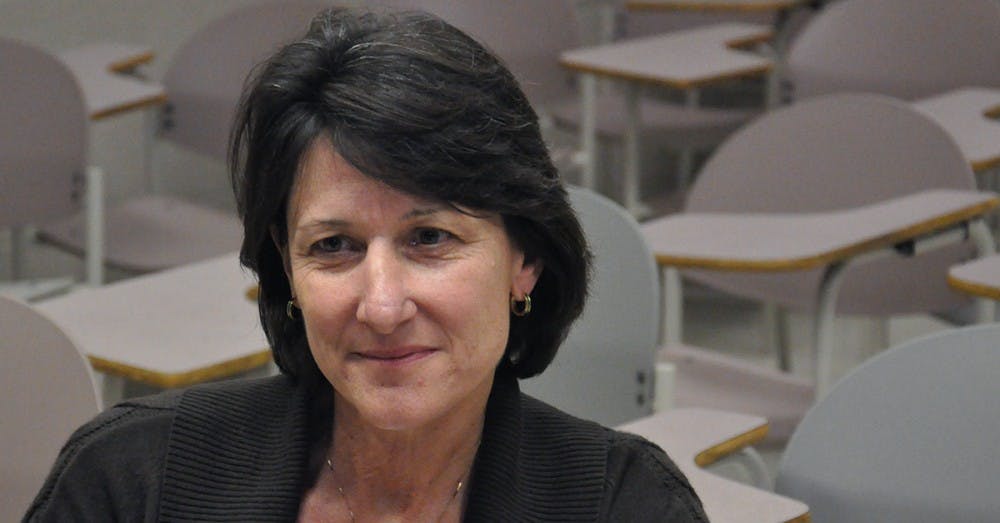“We decided that we wanted to move somewhere and raise our kids, we had three small children, in a university community because we were interested in music, we were interested in sports, we were interested in literature, we were interested in maybe recreating ourselves as something else — a midlife crisis type of thing,” she said.
Although Willingham’s career change came 15 years after graduating from Loyola University in 1984 with a degree in psychology, her exposure to inequality came at a young age.
Willingham grew up in Chicago’s South Side, where she was raised by nuns in an Irish-Catholic area of the city.
She worked in a rectory as a door greeter where she befriended a priest who she said became her mentor and taught her that everyone is created equal.
In addition, she said her parents were involved in efforts to combat white flight to the suburbs in the 1970s.
“We all have the same hopes and dreams, we all want the best for our families and it doesn’t matter what color your skin is … we should all be able to live together,” she said.
She admits she felt somewhat naive when she arrived at UNC in fall 2003, having never taught at a large university. She said she felt insulated in the athletic department.
“There’s a little bit of a bubble around the athletic/academic area so it took a long time for me to get really familiar with the other side of campus,” she said.
Onto the national scene
Recently Willingham has taken to the national stage in her advocacy for increased educational resources for athletes, which has caused a stir within the UNC community.
Willingham has been subjected to death threats, media stakeouts of her home, and a Twitter user making negative comments about her husband’s business.
Yet somehow, she manages to sleep.
To get the day's news and headlines in your inbox each morning, sign up for our email newsletters.
“The thing is that when you’re telling the truth, sleep is not a problem,” she said.
Willingham, who considers herself a loyal follower of UNC sports, insists that her whistleblowing efforts are being done to protect the athletes, not undermine them.
She said it is also important not to ignore the issues of race and class that play into the conversation.
“The literacy levels for African-American males across this country are so low by the time they’re in eighth grade their literacy levels are significantly behind,” she said. “We have a real educational inequality issue, and this NCAA sports machine feeds this issue of educational inequality and a lack of access.”
Willingham sits on the advisory committee for The Drake Group, an organization started by members of the academic community to address concerns around revenue sports corrupting college campuses.
She was awarded the 2013 Robert Maynard Hutchins award, which is given to a university faculty member each year who stands up for academic integrity and often risks losing their job.
Drake Group President Allen Sack, who has known Willingham for a year, said she has provided valuable information on athlete literacy.
Sack said he thinks Willingham is remarkable for presenting a positive self-image in the face of criticism.
“If I were under the kind of pressure that she’s under I would wilt,” he said. “But she just kind of keeps on coming back with the feeling of self-assurance that she is saying what is correct, what is honest, what has to be said and she has incredible integrity.”
Business as usual
Willingham continues to perform her job functions as an academic adviser and coordinator of UNC’s peer tutoring program. She said her friends and colleagues have been very supportive and she is asked for five letters of recommendation each day.
Senior Megan Flynn, who has had contact with Willingham through the program, said Willingham’s message is an important step toward transparency for the University. She said she thinks Willingham is happy with what she is doing.
“After all my years working under her, I can say she is one of the most fair and honest University employees I have known,” she said.
Graduation adviser Richard Cramer said he has known Willingham for the past year and thinks she is fighting for a worthy cause.
“She’s very committed to what she does. I mean she’s a hard working person, cares about the students a lot, she’s come into this office only this past year and she’s mastered what we do here,” he said.
Cramer said he has not interacted with Willingham enough to notice any changes in her mood, but he thinks she is handling the administration’s criticism well.
“My impression is that she is a very ethical and very committed person who really is able to handle an awful lot of pressure,” he said.
“There’s a breaking point for anybody, but I haven’t seen that yet.”
university@dailytarheel.com




